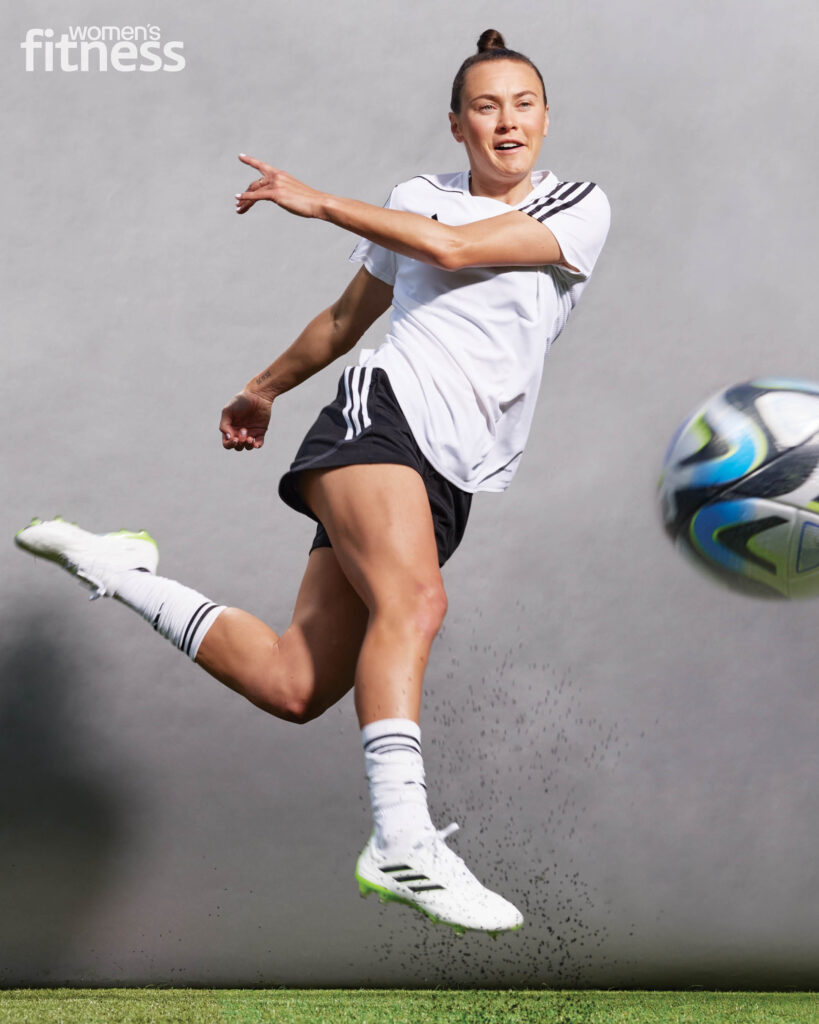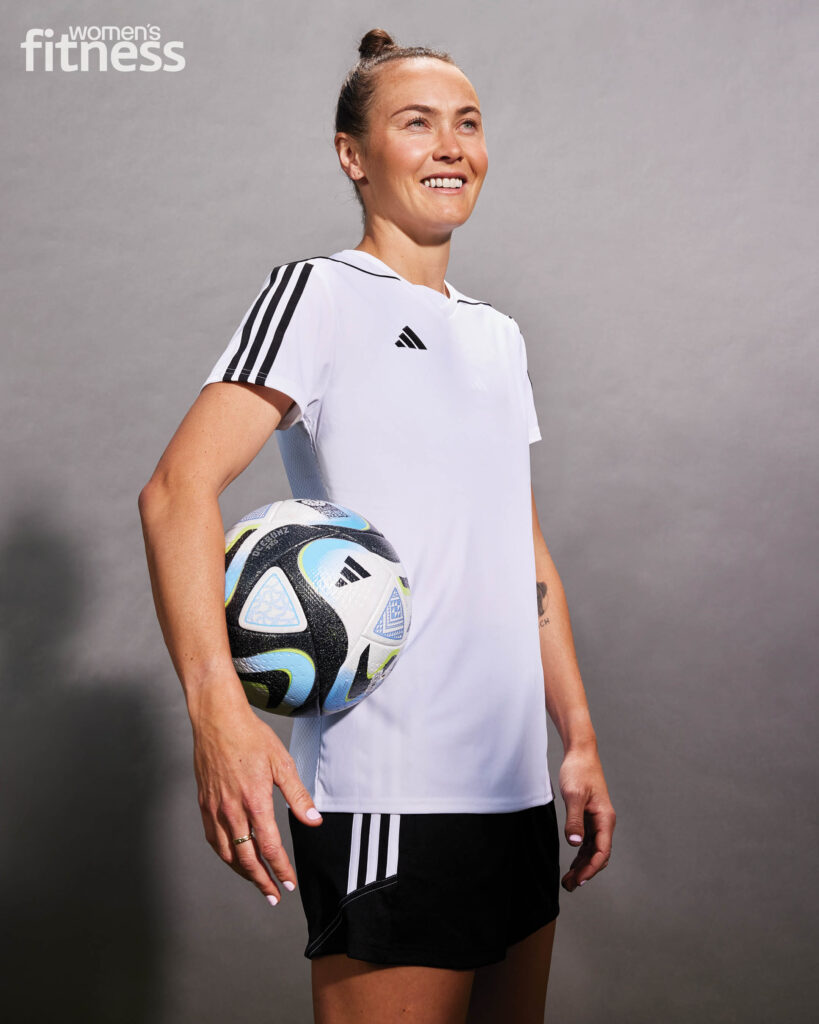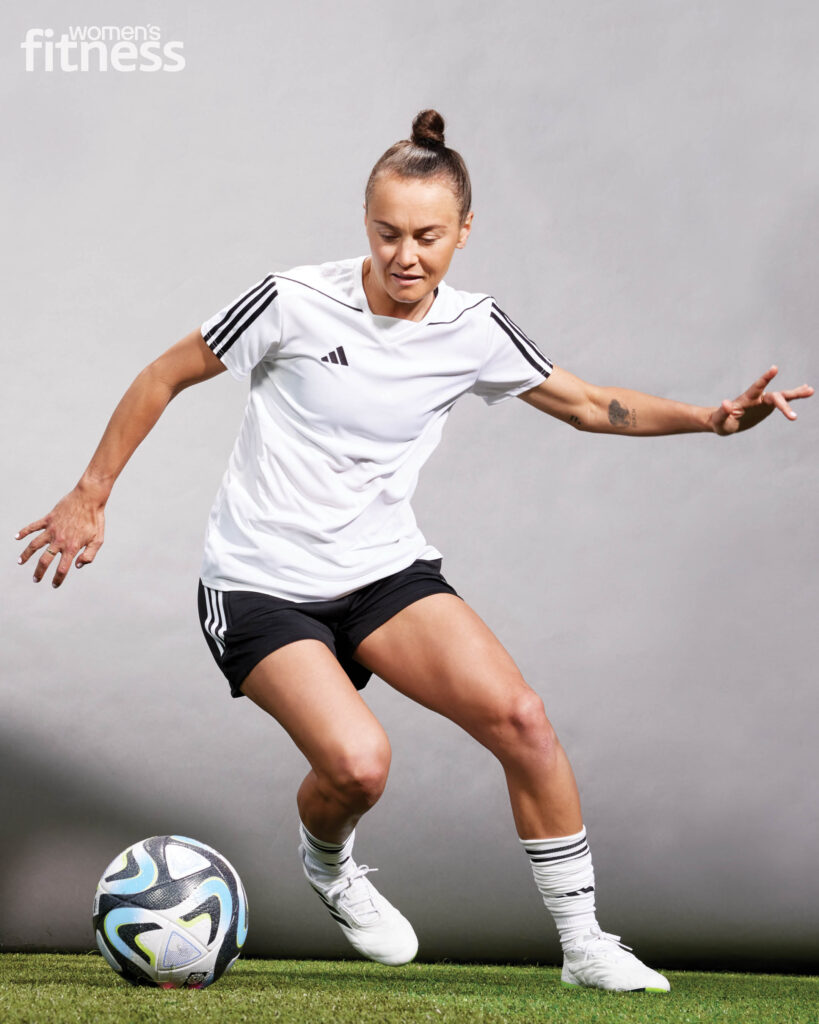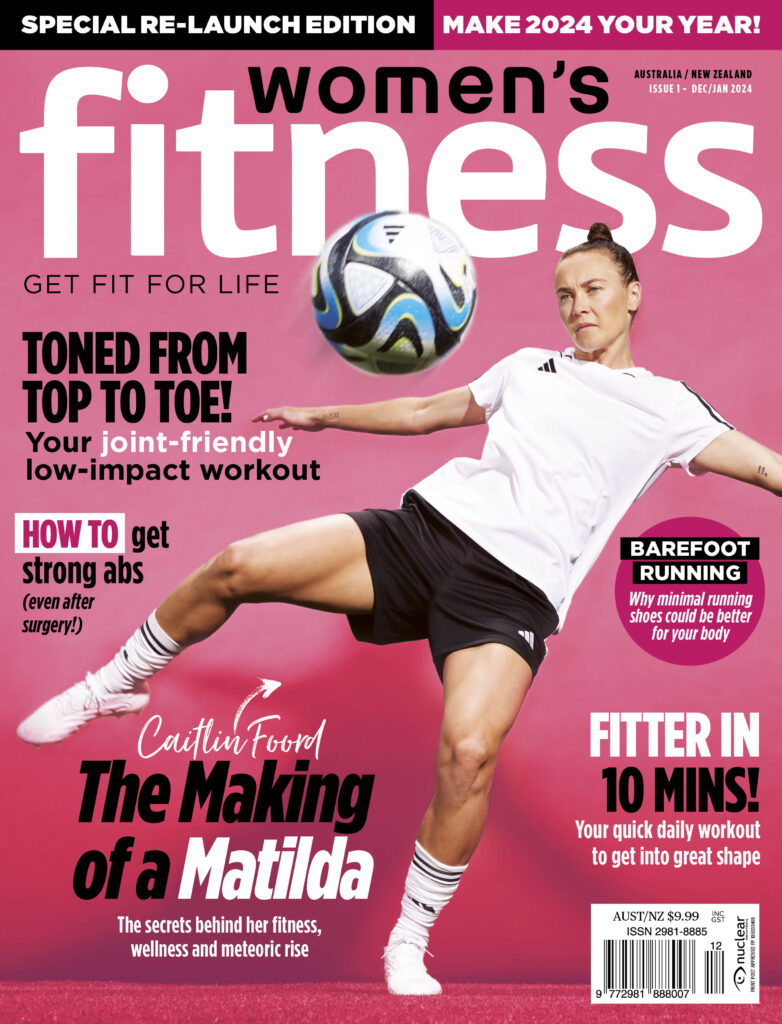International football icon Caitlin Foord reveals the secrets behind her fitness, wellness and meteoric rise.
Born on the beaches of Shellharbour in Sydney’s south coast, Caitlin Foord was just a teenager when she shot to fame debuting for The Matildas at the 2011 FIFA Women’s World Cup, the youngest player ever to do so. 12 years on and this “fearless kid” from Wollongong has cemented herself internationally as a star of the game. With a global Adidas sponsorship deal (and 30 storey billboard to boot), 2 W-League Premierships, a host of appearances in America’s NWSL and Japan’s L.League, she is a shining light in the Matilda’s rise to prominence and an inspiration to her family, her team mates and little girls everywhere. She’s humble, she’s hungry and she’s most definitely one of the hardest workers in the room, if not the world. Now based in the UK where she plays for Arsenal, Caitlin took some time out to talk to us about all things mindset, motivation, overcoming adversity and why there is no I in Team.
Q. You come from a very tight knit family where you were the only sporty one; was everyone supportive of your decision to pursue elite sports? Was there ever another career path that you considered?
I played every sport as a kid – I was so active and wanted to do anything and everything. Football was actually the last sport I tried, but even at a young age I saw the opportunities that it could give me with travelling overseas. I was 13 or 14 when I went on my first trip with the Matildas Under 17s to Malaysia, and I got to feel what it was like to play for Australia. In the end, that made my decision pretty easy. I loved touch football and I grew up watching rugby league – I think if the pathways were different then, and rugby league was as big as it is now, I’m not sure I would be playing football. So, I guess it was good the way it all ended up! I don’t regret my decision at all.
Q. You’re only 28, yet you’ve been considered one of the greatest players in the world for over a decade to the point where defenders have described you as “unplayable” – did you or do you ever doubt in your own ability? And if so, how do you silence those negative thoughts?
I think every footballer has gone through a patch where it has been tough and for me, that was after my foot injury back in 2019/2020. After that injury I went over to Portland in America. It was a good team, but I found it hard to feel like myself and started to doubt if I was ever going to be as good as I used to be. Unfortunately, once you get these negative thoughts in your head, they can often have a domino effect. Having a new start after my injury along with the support from my coach at the time really helped. He told me not to put too much pressure on myself and to just give it time. That was something I really needed to hear. Sometimes it just takes time.

Q. Your list of accolades includes FIFA Women’s World Cup Best Women’s Young Player, Asian Women’s Young Footballer of the Year and Matilda’s Cup of Nations winner not to mention being a dual Olympian and the youngest Australian ever to play in a World Cup when you debuted at 16. What would you consider your greatest moment or is it still to come?
I think it’s still yet to come. I’d love to win something with the Matildas. If we were to have a medal around our necks from the Olympics or be on the podium at The World Cup, that would definitely top it all off. Individual awards are always nice, but this is a team sport and you’re playing for the ultimate goal together.
Q. You’ve had the opportunity to play the sport that you love all over the world – from Australia to Japan to the US to the UK where you now play for Arsenal. What is the biggest lesson you’ve learnt to date, and what/who gave you the opportunity to learn it?
You take bits and pieces from everywhere you go, but over time, I have found out how important it is to have balance. You have to do the work on the pitch but you also have to enjoy your time off the pitch as well. That’s what levels it out. When it becomes all about football, it gets too much.
Q. What does an average training week look like for you, and how often do you schedule in dedicated recovery ie sauna, ice baths, massage etc?
At Arsenal we normally have a slow build up to the weekend where gameday is Sunday. We have Thursday’s off, but every other day we have training. Tuesday’s session is a startup session, but Wednesday is harder given that we’re in the gym as well. Fridays are of a moderate intensity and Saturday is a quick training session – a match day minus one. Every Monday is recovery where we have massages, ice baths and any other individual treatments that we need. I tend to have a massage, get on the bike and have a 10 minute spin to flush everything out before just stretching and using the foam roller. Sleep and nutrition are probably the most important straight after the game.
Q. Is there a morning routine you swear by?
No, not really, I just need to get my coffee in the morning! I always get my flat white on the way to training.

Q. How do you fuel your body to perform?
We’re lucky at Arsenal that they put on breakfast, lunch and even dinner if you want it. Breakfast includes omelette on a bagel at the training ground and then lunch varies. Depending on what day we are on will determine if it’s a low carb day, medium carb day or high carb day (closer to the game). The night before the game, I have spaghetti bolognaise.
Q. You’re working out in the gym – what are you listening to?
It varies, but normally upbeat house music. I do like RNB as well, but it depends on what mood I’m in and what kind of workout I’m trying to get. If it’s a hard session, then it’s techno-house.
Q. Injuries are an inevitable part of being an athlete and a broken foot could have derailed your career very early on. How do you mentally navigate that?
I think we as athletes know that injuries are a part of it. It is tough when they happen but you just have to accept them. Your mindset is always on the next thing – you just want to do the work you need to do to ultimately get back on the pitch. It also depends on time – I think while mentally it can be hard, it can also make you miss the game even more and really give you that extra determination to fight your way back.
Q. Social media has provided a space for athletes and fans to have a voice and drive change, however female athletes face 3 x more online abuse than men. How do you deal with the constant online scrutiny?
For me personally, it depends on the game. I think you know yourself if you have had a bad game, made a mistake or missed an opportunity to shoot or score a goal. Obviously the worst thing is to then go online and read about it. It’s easy when you have a good game and you go and read all the wonderful things people say about you, but that can change very quickly. At the end of the day, these are people hiding behind a screen and I don’t read too much into it regardless of whether it’s good or bad. It’s one of the challenges of being a professional athlete – everyone is always watching you and has something to say.

Q. It’s game day. Do you get nerves?
I don’t really get nervous that much anymore, but I did before the opening game of The World Cup. There was just this massive lead in and huge build up and it was a very long time coming. We then had some late changes with Sam Kerr being injured and I had to go into a different position with a different role. I hadn’t felt that nervous in a very long time, but I think that comes with experience. I actually enjoy it when I’m nervous because it just shows it means something to me.
Q. Knowing what you know now about being both a woman and a professional athlete, what advice would you give to the next generation of females coming through?
I think women’s sport is already in a better place than where it has been. We have shown that women can be powerful and we have showcased what we can do, and, on the level that we can do it. I think we need to enjoy that and not be afraid to speak up or be who we are. We’re still trying to prove people wrong in a way, so I would like the next generation of females coming through to not be afraid to do that.
Q. What’s next for you?
Getting the great result that we did coming out of the Olympic Qualifiers means we are in a good position for the next round. The focus and the ultimate goal now is to be in Paris for the Olympics, standing on the podium with a medal around our necks.

For the full article grab the December/January 2024 issue of Women’s Fitness Australia from newsagents and convenience locations. Subscribe here.
Interview by: Alexa Towersey
Photography: Courtesy of Adidas






